In this week’s Accredian Success Story, we feature Sourav Ghosh, who is a Senior Data Engineer at Philips, India and was a part of the PGP DS & AI, 2020 batch at Accredian. He shares his journey of achieving success and landing a career in the Data Science industry. Get to know more about him as he guides us through this amazing process.
Q1. Tell us about your current role and background
I’ve newly joined Philips India, in the Health-Tech division as a Senior Data Engineer. So it’s at the PIC campus in Manyata Park in Bangalore.
The interview process included four rounds, after clearing which, I received a joining letter from Philips.
So the current role is based on our team name RCS. RCC is a part of Philips organization, which is a division called Radiology Operation Command Center.
Q2. Why did you switch to Data Science?
I completed my B.Tech in Electronics and Communication from the year of 2010-2014. I got an on campus job in TCS Tata Consultancy Services as a System Engineer role.
Since then, my work started there as an Assistant System Engineer, but mostly the project was about how the basic analytics are slowly coming by industries. So the project comes with an SQL, Excel sheet, Microsoft Excel analytics, Data Mining and Web Scrapping.
After working there for one year and two months, I moved to Huawei. I joined here as a Peak Data Engineer. That was an initial role and then it slowly started moving to MapReduce which is a part of Big Data.
Q3. Why did you join Accredian Data Science program?
I was introduced to Accredian through a webinar. In that webinar, what really attracted me was the opportunity to do a course related to the platform I was working on.
So the course had telecommunication and telecom analytics as a part. And my platform was telecommunication analytics. So right now Accredian is offering many such courses and is doing a great job on.
I joined a program called Data Science and AI course, while parallely working with Huawei as a Data Engineer. My first mentor was Deepesh Vadhani, thanks to him. He made students interested in the course because he’s a very young teacher full of passion about Data Science.
After that, Dr. Darshingley was there as a mentor. My words will feel short, but I have to tell you about them because they are very helpful. There were lots of webinars that went within Accredian, and I didn’t find any other organizations that do these webinars that actually boost up understanding a lot.
It helped us understand what the industrial requirement actually was. And slowly I prepared for that. And at this moment, since 2020 it is going to be 1.5 years that I am with Accredian to learn. And my process is still going.
I have upgraded myself with a postgraduate program, Data Science and AI course as well. So right now, I’m doing what is a good strategy given by Manjusha and Suchit, which is that for every interview, I jot down the questions and answers, about the programming language, Python, SQL and everything.
This helped me a lot because when I was just going to the next interview for a new company, it was just brushing up on everything, so that I had a full idea of that particular subject. And that helped me a lot. I’d say that Phillips was a result of another thing that I struggled with and I have it down now.
Q4. What challenges did you face while transitioning to a Data Engineer role?
So I have a background from Electronics and Communication and my first mentor Deepesh Vadhani who also has a background in Mechanical Engineering, therefore Data Science is something beyond your creativity.
I was looking for a job from my college. A company called New Sigma was looking for people for a role in data science for a three years contract.
So many people got offers and to be honest, most of the people from mechanical background, don’t have computer science and electronics as their specialisation. It began with an aptitude test and very basic C++ programming.
The inspiration to do Data Science is not from the beginning, but it came later due to the requirements of my job. Data Science is currently an industry that is moving at a fast pace, and by 2030 everything is going to be flooded with Analytics and AI.
Growth depends on the feedback that comes from customers, and how to provide and improve on it. Data Science and all the data fields are like that.
Q5. What interview questions were you asked?
When you sit for interviews, most industries require three things. One, you have a cloud experience. It can be any cloud, it can be Azure, AWS (Amazon) or Google. So out of these three, you should have experience with one.
The Data Engineer prospect not only serves data integrating, it also partially serves the data Scientist role especially for all industries in India. You are not only a Data Engineer, you also have to tell a story, you also need to do Data Visualisation in the industry right now.
So for that you have to be creative. So it also contributes a little bit to Data Science because this part in the industry right now includes ML, AI and everything, but Data Science also includes Data Visualization, which includes data engineers also.
Secondly, you should have good SQL knowledge. You should have good Python knowledge. So these two things are very basic that have to be included in your resume. When you’re sitting for any of the interviews, including data analytics, data science, engineering, anything, that’s the first thing you will be asked about.
Accredian’s Python strategy helped me a lot. Because Python standard was made by switches. It started from scratch and progressed to everything about Python. Do follow a website called geeks for geeks.
This helped me a lot because there are lots of questions that are quite compliant with the industry and few of the companies they ask directly from this website. Make sure to be part of hackathons because this will also help before the interview.
Few blogs on LinkedIn, like Steve Nudy, Arjun Panwar, are very good to follow. They’ll provide you with cheat sheets which will help you with brushing up your skills quite quickly.
ML AI courses by Andrew NG, who is famous across the globe for his AI courses, can also help you prepare for interviews.
At Philips, there is a given data set of the COVID cases. So we are asked to use the SQL analytical functions to make a dashboard. Where are the maximum cases in which region? And where are the fewer cases depending on the date?
This was the dashboard we had to create. For that you need SQL and analytical function knowledge. I believe you should learn all this together.
Q6. What advice would you give to Data Science beginners?
I’d suggest to the beginners that you shouldn’t be quite confused with lots of things that are going on in the market. As they say, too many spices spoil the food. First believe in yourself and learn from your dedicated blocks and dedicated channels.
You should be dedicated enough and be honest with your knowledge of Data Science. It’s very new. So the people in the interview who want to ask you questions are also in the learning phase like you.
Maybe the interviewer is a very skilled person, because he’s much more experienced than you. But knowledge wise, if you are doing very hard work on your subject, you can know much better. Prepare very well for any of the upcoming interviews that come your way.
We hope you found this success story interesting. If you have any Data Science questions, please fill this form and we will get back to you.

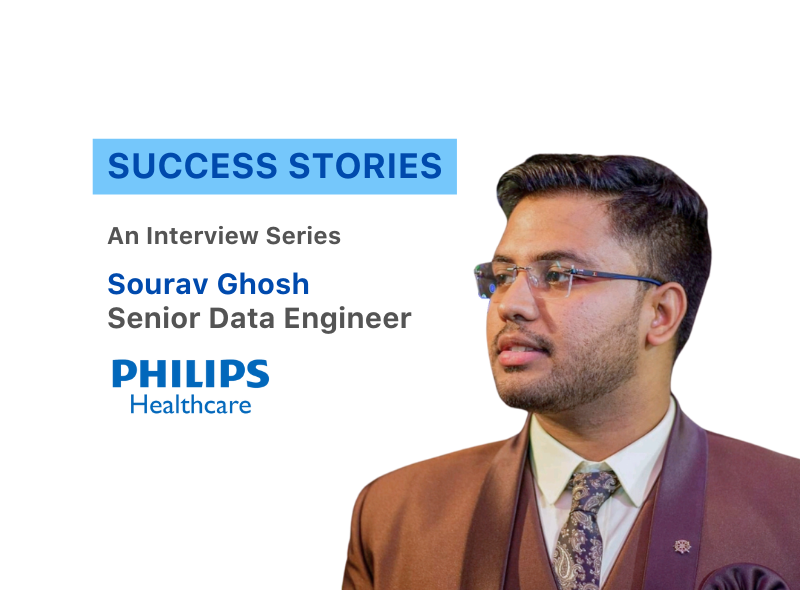
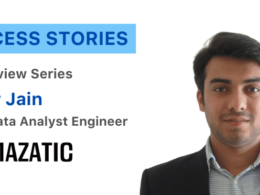
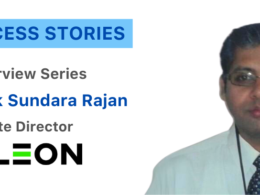
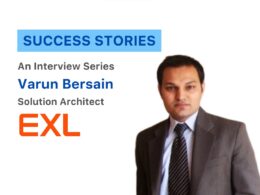
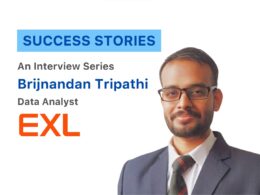

2 comments